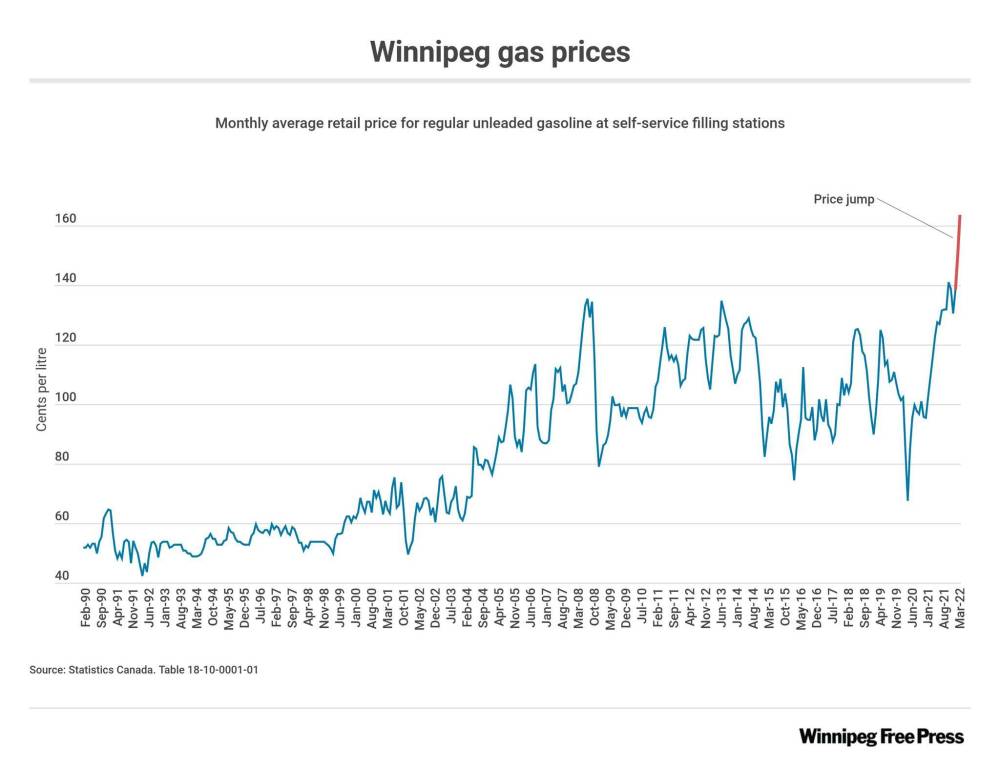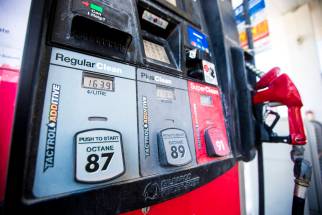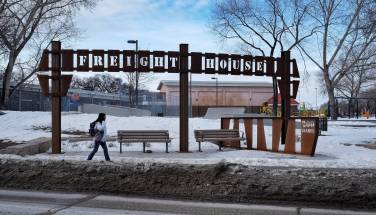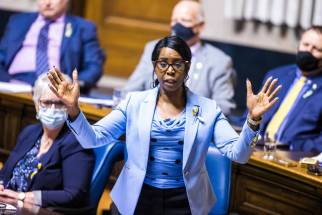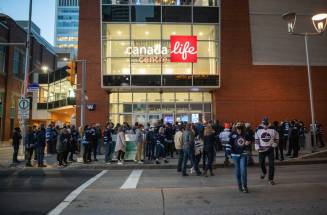Gas pains Price of everything will go up as Putin’s war sends fuel prices to record highs
Read this article for free:
or
Already have an account? Log in here »
To continue reading, please subscribe:
Monthly Digital Subscription
$0 for the first 4 weeks*
- Enjoy unlimited reading on winnipegfreepress.com
- Read the E-Edition, our digital replica newspaper
- Access News Break, our award-winning app
- Play interactive puzzles
*No charge for 4 weeks then price increases to the regular rate of $19.00 plus GST every four weeks. Offer available to new and qualified returning subscribers only. Cancel any time.
Monthly Digital Subscription
$4.75/week*
- Enjoy unlimited reading on winnipegfreepress.com
- Read the E-Edition, our digital replica newspaper
- Access News Break, our award-winning app
- Play interactive puzzles
*Billed as $19 plus GST every four weeks. Cancel any time.
To continue reading, please subscribe:
Add Free Press access to your Brandon Sun subscription for only an additional
$1 for the first 4 weeks*
*Your next subscription payment will increase by $1.00 and you will be charged $16.99 plus GST for four weeks. After four weeks, your payment will increase to $23.99 plus GST every four weeks.
Read unlimited articles for free today:
or
Already have an account? Log in here »
Hey there, time traveller!
This article was published 03/03/2022 (1382 days ago), so information in it may no longer be current.
Gas prices in Manitoba hit a record high Thursday and are expected to continue rising in the coming weeks, experts say.
Many pumps in Winnipeg offered fuel at nearly $1.64 per litre. Outside the city, in Oak Bluff, gas was advertised at almost $1.65 per litre.
“I wouldn’t bet on oil prices going down… this will probably last years,” said Barry Prentice, a supply chain management professor at the University of Manitoba.
Unleaded gas prices are up, on average, 44 cents per litre over last year, according to data from GasBuddy, a fuel cost tracking platform.
“I wouldn’t bet on oil prices going down… this will probably last years.”
– Barry Prentice, supply chain management professor at the University of Manitoba
“It’s crazy,” said Winnibel Cabrera, who waited for gas alongside rows of cars at the Costco on McGillivray Boulevard Thursday.
Traffic spilled out of the gas bar lot as folks eyed pumps offering fuel for $1.49 per litre.
“The salary rate is still the same, but the groceries and the gas are getting (more expensive),” said Cabrera, who works in a dental office.
The extent of gas price hikes will depend on the war in Ukraine, Prentice predicts.

“If this drags on and on, then I think the situation will get worse for oil prices, because then we may well start seeing some impacts,” he said.
Oil is a global market. Russia is one of the world’s major exporters, but many oil companies have pulled out of the country because of the invasion. The uncertainty over oil supply has added to the market’s havoc, Prentice said.
It comes after oil exporters cut back on production during the pandemic and many people have shifted their focus to climate change.
“We’re getting more and more messages of ‘We’ve got to get off oil,’ so the incentive to expand is certainly being hit,” Prentice said.
Public health restrictions are loosening and the economy is accelerating, which means more cars on the road and planes in the air, Prentice noted.
So, there’s a global worry about supply and demand is up. Manitoba isn’t facing a shortage of fuel, but “we float with the world price,” Prentice said.
“All prices are connected everywhere,” he said.
… the rising price of diesel, used by transport trucks and farm vehicles, will hit Manitobans when they buy groceries or goods. Food prices could increase by 30 to 35 per cent year over year as industries pass energy costs to consumers
Dan McTeague, president of Canadians for Affordable Energy, predicts gas prices could hit $1.75 a litre in Manitoba if oil costs continue to rise and the conflict in Ukraine continues.
“We’re all in record territory (in Canada),” McTeague, who runs the Gas Wizard fuel prediction website, said.
A weak Canadian dollar, carbon taxes and the impending switch from winter to summer fuel will also affect prices, McTeague said.
He warned the rising price of diesel, used by transport trucks and farm vehicles, will hit Manitobans when they buy groceries or goods. Food prices could increase by 30 to 35 per cent year over year as industries pass energy costs to consumers, he said.
Travellers may see fuel surcharges on their plane tickets in the near future, according to John Gradek, aviation expert and McGill University lecturer.
“From an airline’s perspective, the pandemic hit the revenues, fuel’s going to hit the expenses,” Gradek said. “It’s going to hit the profitability of the airlines significantly.”
The sharp increase of oil barrel costs comes after two years of minimal revenue in the industry.
Davinder Singh, who drives for a food delivery company, has watched his income drop as gas prices rise.
“(They’re) really high,” he said glumly on Thursday, noting he pays to fuel his car.
“From an airline’s perspective, the pandemic hit the revenues, fuel’s going to hit the expenses. It’s going to hit the profitability of the airlines significantly.”
– John Gradek, aviation expert and McGill University lecturer
Singh said he makes minimum wage and finds it hard to afford gas.
Ottawa is preparing to increase Canada’s carbon tax on April 1 to 11 cents per litre, according to the Canadian Taxpayers Federation. The CTF is calling on the government to scrap the tax.
“People have been struggling… (with) pay cuts, job losses, businesses closed down,” said Franco Terrazzano, the CTF’s federal director. “Canadians can’t afford higher taxes, and we’re seeing the cost of living going through the roof.”
“This is the worst possible time for the federal government to be raising the carbon tax,” Terrazzano said.
He pointed to South Korea and Poland, among others, as countries who’ve waived similar fees.
“The province can provide relief too by reducing the provincial fuel tax bill,” Terrazzano said.

Normally, about 20 per cent of Sierra Courier’s budget is spent on fuel, according to president Scott Lins.
“You have to become as efficient as possible,” Lins said. “Not that we wouldn’t try and optimize routes anyways, but (there’s a) pressure to become more efficient in terms of the routes that you drive.”
Lins has considered switching to an electric fleet, but there aren’t many options available, and those for sale really hurt the wallet, he said.
“We just need more opportunities,” he said.
Meantime, the courier’s services will be pricier because of fuel costs.
“You can’t absorb that — it’s far too great,” Lins said.
Exorbitant fuel prices may lead people to buy electric cars, but it will take many years before a full shift from gasoline and diesel can happen, Prentice said.
Less than two years ago, Winnipeg recorded its lowest average price of unleaded gas — 66.4 cents per litre on April 28, 2020, GasBuddy reported.
– With files from Chris Kitching
gabrielle.piche@winnipegfreepress.com

Gabby is a big fan of people, writing and learning. She graduated from Red River College’s Creative Communications program in the spring of 2020.
Our newsroom depends on a growing audience of readers to power our journalism. If you are not a paid reader, please consider becoming a subscriber.
Our newsroom depends on its audience of readers to power our journalism. Thank you for your support.

